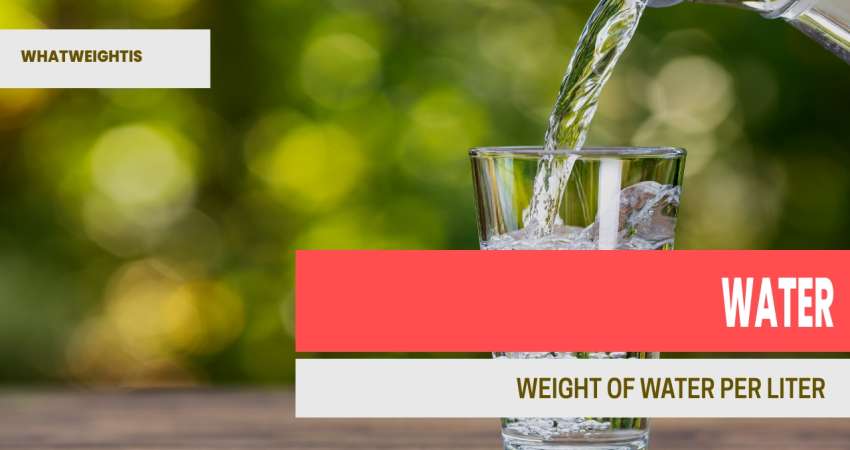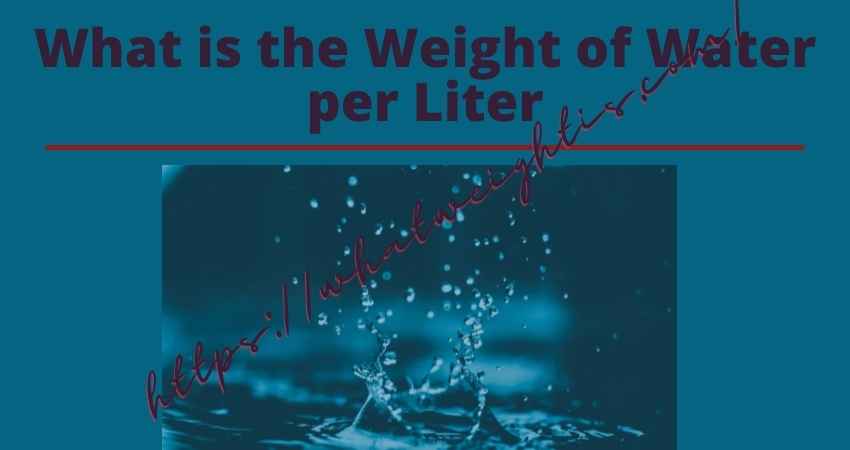The Weight of Water per Liter is 1 kg. This may seem like a simple fact. But, it actually tells us a lot about the relationship between mass and volume. In order to measure the density of an object, we need to know its weight in kilograms per liters. Here, are some more facts about the weight of water per liter. Weight of Water per Liter = 1 kg/L
The density of water is 1.0 g/mL or 1000 kg/m3 (kilograms per cubic meter). So, the weight of a liter of water is exactly one kilogram. If you were to pour 100 lit ers of water into a 100 liter container, the total weight would be 10,000 kg. If you were to pour 100 liters of water into a 1-liter container, the total weight would be 1 kilogram.

How does the density of water change with temperature and pressure?
The density of water is not constant over time or place. The density of water changes with temperature and pressure. The density of water decreases as the temperature increases. For example, at 0°C (32°F), the density of water is 1 g/mL or 1000 kg/m3. At 30°C (86°F), the density of water is 0.8 g/mL or 800 kg/m3. At 100°C (212°F), the density of water is 0.6 g/mL or 600 kg/m3. The density of water also changes with pressure. The density of water increases as the pressure increases. For example, at 101 kPa (1 atm), the density of water is 1 g/mL or 1000 kg/m3. At 200 kPa (2 atm), the density of water is 0.8 g/mL or 800 kg/m3. https://youtu.be/ULYBXxAP7vU
Weight Of Water Per Liter
Weight of a liter of water = 1 kg
The density of a given amount of water is easy to calculate. The amount of water can be any volume you choose. Just simply multiply the weight by the density of water at that temperature and pressure.
Did you know that the weight of water is roughly 8.35 pounds per gallon? This may vary slightly by region, but in general it’s true….
What is the water content of meat, fish, or vegetables?
One way to find out how much water is in a certain amount of meat, fish, or vegetables is by using a refractometer.
This tool can be found at your local drugstore and will measure the amount of sugar, salt, or other minerals present in the food that you are measuring.
A refractometer is made up of two prisms that are mounted inside a clear tube with an eyepiece on one end and a bulb on the other.
The user simply places their sample under the lens and reads off the result which will give them information about what kind of salt/concentration content is present in their food. The refractometer is also helpful in guiding the user to find less salt and fat while at other times there may be a need for more.
For instance if one were looking to cut out calories or weight loss this might be accomplished by making adjustments based on what they read from their refraction results so it would help maintain any type of health goals they decided upon.
Why does 100 ml of liquid water weigh 100 grams?
The weight of 100 ml of liquid water is equal to the weight of 100 grams. This happens because when you take in water, it fills up your stomach and when it does so, it takes up space in your body.
Water has a density that is 1 gram per milliliter which means that 100 ml of liquid water weighs about 0.1 kg.
How much does a liter of honey weigh?
The weight of a liter of honey is approximately 3.130564 pounds or 1.42 Kilograms, which is about the same as an apple and slightly more than a pound or kilogram of butter.
1 gallon of water weighs 8.34 pounds which is 3770.63 grams or 133.0 ounces in american system.
Mr. Jahangir Alam is an Electrical & Electronics Engineer with a wide range of experience in several fields of Engineering. He finds engineering articles to be very interesting, and that is why he likes to write them. To know more about him, please click here.

